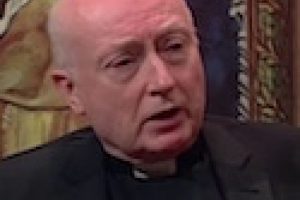Column: From the Pastor
While demagoguery is rampant among those who distort the “wall of separation between Church and State” to promote a secularity never intended by our nation’s founders, one has to be cautious about sacralizing politics and politicizing religion. That feeds cynicism and fosters rebellion. When church leaders spend more time addressing public issues of a subjective nature than teaching objective essentials of faith and morals, they can be as self-satirical as Bull Moose Progressives. As the bishops were preparing a pastoral letter on war and peace in 1983, Archbishop Philip Hannan of New Orleans, spoke out. He was the only bishop there who had served in World War II, as a chaplain in the 82nd Airborne Division in the Ardennes Offensive. Invoking Trumanesque diction, he told his episcopal brethren that they did not know what they were talking about.
Those who inflate themselves with assumed moral superiority while skipping lightly over hard facts, tend to be uniform in their notions of enlightened thought. One recalls an Irish bishop who refused to shake the hand of President Reagan, whom he called inhumane. And there was an American archbishop who declared Reagan’s economic policies unprincipled. The bishop was later exiled for having fathered a child, and the archbishop was found guilty of embezzlement and other transgressions. Self-congratulatory moral posturing called “virtue signaling” can be a semaphore for hypocrisy. It is condescension from below.
The Church’s prophetic voice is also hoarsened when it agrees to remove religious symbols in its schools in exchange for government funding, or when its social agencies rely on significant federal subsidies for staffing their charitable programs.
A cleric will have his personal views on prudential matters, but he becomes a clericalist when he stereotypes those who disagree with him as “un-Christian” or “un-American” or, mirabile dictu, both. Clericalism politicizes a sacerdotal charism in order to intimidate. To sanctimonious politician and priest alike, Samuel Johnson speaks from the grave: “My friend, clear your mind of cant.”
——————–
Fr. George W. Rutler, S.T.D., is pastor of St. Michael’s parish in New York City. A donation of any amount may be made to the parish at: www.StMichaselNYC.com. To learn more about Fr. George W. Rutler, go here. His latest book, “He Spoke to Us – Discerning God’s Will in People and Events,” is now available in paperback is available here. His book, “The History Behind 100 of Christianity’s Greatest Hymns” is available here, and any of his remarkable books are well worth the read and can be found here.
View Articles Father Rutler was ordained to the diaconate in Rome by His Eminence William Cardinal Baum in 1980 and received priestly ordination in St. Patrick's... MORE »



You must be logged in to post a comment.